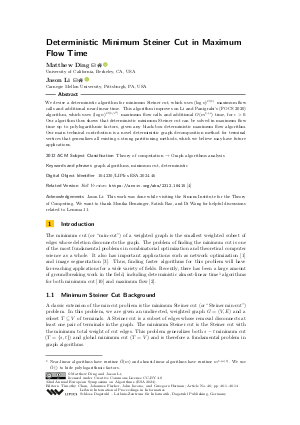LIPIcs.ESA.2024.46.pdf
- Filesize: 0.85 MB
- 14 pages

 Creative Commons Attribution 4.0 International license
Creative Commons Attribution 4.0 International license

We devise a deterministic algorithm for minimum Steiner cut, which uses (log n)^{O(1)} maximum flow calls and additional near-linear time. This algorithm improves on Li and Panigrahi’s (FOCS 2020) algorithm, which uses (log n)^{O(1/ε⁴)} maximum flow calls and additional O(m^{1+ε}) time, for ε > 0. Our algorithm thus shows that deterministic minimum Steiner cut can be solved in maximum flow time up to polylogarithmic factors, given any black-box deterministic maximum flow algorithm. Our main technical contribution is a novel deterministic graph decomposition method for terminal vertices that generalizes all existing s-strong partitioning methods, which we believe may have future applications.


Feedback for Dagstuhl Publishing